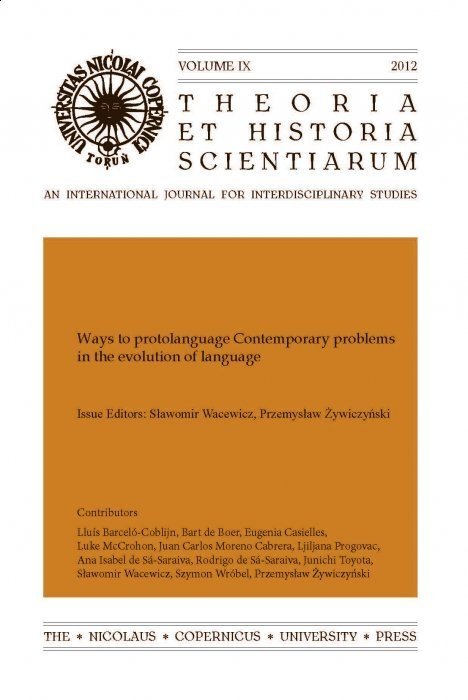Dr Sławomir Wacewicz jest adiunktem w Katedrze Filologii Angielskiej UMK w Toruniu. Od wielu lat publikuje artykuły dotyczące ewolucji języka. Jest też autorem monografii Concepts as Correlates of Lexical Labels (2015).
Theoria et Historia Scientiarum, IX (2012): Ways to protolanguage Contemporary problems in the evolution of language
The texts gathered in this volume reflect some of the breadth of the rapidly developing research area of the evolution of language. The articles reflect many of the focal threads of this research field and, taken in toto, can be treated as a record of some the current controversies in language evolution studies. There is a growing interest among linguists to incorporate evolutionary concerns in their modes of language analysis - in the volume, the linguistic or linguistically oriented contributions focus on such areas of language description as articulatory phonetics (Bart de Boer), syntax and the origins of grammar (Eugenia Casielles and Ljiljana Progovac, Ljiljana Progovac, Junichi Toyota), and broadly understood pragmatics (Przemysław Żywiczyński). These are followed by papers primarily centring on evolutionary concerns, related to research in cognitive psychology and paleoanthropology (Rodrigo de Sá-Saraiva and Ana Isabel de Sá-Saraiva), sound symbolism (Juan Carlos Moreno Cabrera) and memetics (Luke McCrohon). The volume is complemented by more theoretical works, employing the methods of analytical philosophy to clarify fundamental conceptual issues in the evolution of language research (Szymon Wróbel, Sławomir Wacewicz). Together with Lluís Barceló-Coblijn's comprehensive study on the evolution of recursion, those three texts reflect on the problems posed by Hauser, Chomsky and Fitch (2002) in their seminal article "The faculty of language: What is it, who has it, and how did it evolve?".
Sławomir Wacewicz
- Theoria et Historia Scientiarum, XV (2018): Competence for Foreign Language Learning and Teaching
- Theoria et Historia Scientiarum, XIV (2017): Spectrality and Cognition: Haunted Cultures, Ghostly Communications
- Theoria et Historia Scientiarum, XII (2015): Insights and Outlooks: Cognitive Approaches to Culture, History, Psychology, and Language Teaching
- Theoria et Historia Scientiarum, XVI (2019): How did language evolve? Biological, psychological, and linguistic perspectives
- Theoria et Historia Scientiarum, XVII (2020)
- Theoria et Historia Scientiarum, XI (2014): Multiple perspectives on language origins
- Ewolucja języka. W stronę hipotez gesturalnych
- Theoria et Historia Scientiarum, IX (2012): Ways to protolanguage Contemporary problems in the evolution of language
Przemysław Żywiczyński
Dr hab. Przemysław Żywiczyński pracuje jako adiunkt w Katedrze Filologii Angielskiej UMK w Toruniu. Jest autorem książek – Buddhism and Meaning (2004) and The Axiology of Spoken Interaction (2010) – oraz wielu artykułów z zakresu ewolucji języka, pragmatyki językoznawczej i buddologii.
- Theoria et Historia Scientiarum, XIV (2017): Spectrality and Cognition: Haunted Cultures, Ghostly Communications
- Theoria et Historia Scientiarum, X (2013): Synesthesia
- Ewolucja języka. W stronę hipotez gesturalnych
- Theoria et Historia Scientiarum, XV (2018): Competence for Foreign Language Learning and Teaching
- Theoria et Historia Scientiarum, XVII (2020)
- Theoria et Historia Scientiarum, XVI (2019): How did language evolve? Biological, psychological, and linguistic perspectives
- The Axiology of Spoken Interaction. An Essay on the Organisation of Conversational Behaviour
- Theoria et Historia Scientiarum, IX (2012): Ways to protolanguage Contemporary problems in the evolution of language
- Buddhism and Meaning: Comparative Assessment of Buddhist Views on Cognition, Meaning, and Language
- Theoria et Historia Scientiarum, XI (2014): Multiple perspectives on language origins






